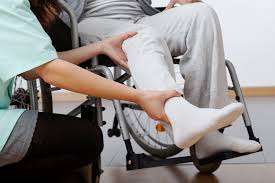
What Is Neurological Physiotherapy ?
Neurological physiotherapy is specific to treating individuals who suffer from a neurological disorder or disease affecting the central nervous system. These include Alzheimer’s disease, ALS, brain injury, cerebral palsy, Charcot-Marie-Tooth disease (CMT), multiple sclerosis, Parkinson’s disease, spinal cord injury, and stroke. Patients who suffer with any of the above mentioned condition may often battle neurologic impairments of activities of daily living, ambulation, balance, functional independence, movement, muscle strength and loss of vision. Neurological Physiotherapy can address many of these impairments and aid in restoring and maintaining function, slowing disease progression, and improving quality of life.
Neuro Conditions
Neurological physiotherapy also addresses conditions affecting the peripheral nervous system, such as Guillain Barre Syndrome, peripheral neuropathy, diabetic nerve problems. Other injuries are sustained from nerve compression, like carpal tunnel syndrome or thoracic outlet syndrome. In some cases, like complex regional pain syndrome and brachial plexus injuries, the problem begins after an injury.
Symptoms often start gradually, and then get worse. They include: burning or tingling, numbness, muscle weakness, pain and sensitivity to touch.

What our Neuro Physiotherapist Treat?
Stroke
Acquired Brain Injury
Multiple Sclerosis
Parkinson’s Disease
Spinal Cord Injury
Balance and Mobility Issues
Difficulty in Walking
Ataxia
How we do it
- Passive Limb Exercises: if you are unable to move your arms and legs yourself
Positioning / Splinting: correct limb positioning, or splint prescription, to ensure that your joints don’t tighten
Bed Exercises: to stretch and strengthen your muscles
Breathing and Circulation Exercises: to prevent respiratory and vascular complications such as chest infection and DVTs
Mobilisation: assistance to move safely in bed, sit up, stand and walk
Mobility Aids: prescription, advice and instruction on how to safely use a walking frame, or other walking aids as required
Discharge Planning: information regarding any necessary equipment that you may require at home after discharge
Tailored Exercise: exercises to build strength, endurance, coordination and balance

What Are Benefits Of Neuro Physiotherapy
Better balance and coordination.
Improved walking.
Optimized function on affected areas.
Increased stamina and endurance.
Increased strength and less tension in affected muscles.
Reduced contractures.
Optimized independence.
Assessment
The physical assessment helps us determine the source of the pain and its impact on your body mechanics. Completion of the assessment provides our experienced physiotherapists with a working diagnosis to plan a course of treatment

